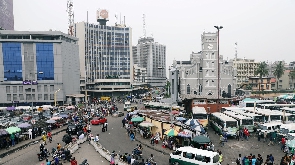Nigeria trails Togo, Kenya, South Africa, Ghana and even Haiti in its UN Human Development index rank for 2021 – Ghana research firm
Nigeria's revenues are among the lowest in the world, according to research conducted by Ghanaian investment firm, Tesah Capital.
The report stated that over the last ten years, the country's revenue-to-GDP ratio has decreased.
"Although Nigeria is known as Africa’s largest economy and most populous country, (Real GDP (2021)- $518 billion, World Bank), the country continues to record poor performance in its tax-to-GDP ratio," indicated Tesah Capital.
The 2021 Human Development Index (HDI) released by the United Nations Development Programme ranked Nigeria 163 out of 191 countries with 0.535 points, trailing behind Ghana, Togo, Kenya, and Haiti among others.
The report measures the average achievements of a country in three basic dimensions of human development which is calculated using four indicators - life expectancy at birth, mean years of schooling, expected years of schooling, and the Gross National Income (GNI) per capita.
In 2021, Nigeria’s economy grew by 3.6% from a 1.8% contraction in 2020, underpinned by a 4.4% expansion in the non-oil sector against an 8.3% contraction in the oil sector; non-oil growth was driven by agriculture (2.1%) and services (5.6%).
This, the report stated, was majorly a result of the severe impact of the COVID-19 pandemic.
In the first quarter of 2023, Nigeria recorded slowed economic growth as the Gross Domestic Product (GDP) grew by 2.31 percent year-on-year.
This was announced by the National Bureau of Statistics in its “Nigerian Gross Domestic Product Report Q1 2023”, released on Wednesday, May 24.
Meanwhile, the reduction in growth is attributed to the adverse effects of high inflation, foreign exchange shortages, and the cash crunch experienced during the quarter associated with the Naira redesign and political transition.
Tesah Capital in its research stated that though Nigeria’s debt to GDP (37.3%) is lower than the sub-Saharan African average (58.2%), the FGN interest payment to FGN revenue is unsustainable at 96.3%.
The firm recommended policies to improve the country’s poor performance and debt crisis stating that the government of Nigeria must diversify and restructure the economy, and reform economic institutions for independence and market confidence.
"This will create sustainable fiscal space and invest right," it noted.
However, the Nigerian government is hopeful of an improvement in its economy following the handover of power from former President Muhammadu Buhari to President Bola Tinubu on May 29.
One of the first changes made by the Tinubu administration was the removal of fuel subsidies.
This has brought discomfort to the citizens as the surge in petroleum prices has impacted on the cost of living and other commodities.
Business News of Wednesday, 7 June 2023
Source: www.mynigeria.com













